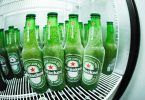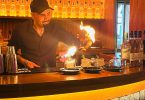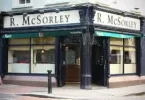On again, off again – the story of the Irish pub reopening(s)
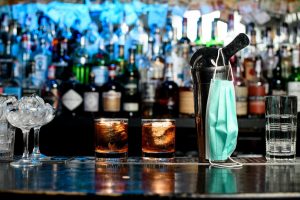
Well before Level 5 was declared just over a week ago, the original postponement of his pub being allowed to reopen at the end of June took its toll on Tom Dunbar of Dunbar’s pub in Ferns, County Wexford.
“I didn’t go back down to the bar for two or three weeks afterwards,” he recalls.
A publican of 50 years standing, in a pub dating back to 1882, he’s never experienced anything so damaging. For him, the on/off again reopening of pubs by the government has been painful – mentally as much as physically.
For people like Tom reopening has been a fraught learning process.
“We were a bit more cautious about what we were doing after that and so stock didn’t come before the rug was pulled the second time,” he says.
Three false starts later – and with the accompanying drain on finances, effort and mental wellbeing – he was able to open once more.
But he’d to put up Perspex screens at the counter and capacity was clearly reduced when he reopened, having reorganised the seating to comply with Social Distancing and having installed appropriate signage.
This had all been done before the first June reopening date, subsequently postponed by Government.
“We’d everything ready” he remembers, “with everything polished, painted and cleaned.
“The suppliers were very good ‘though and we’d no problem getting stuff back when reopening didn’t happen.”
The failure to reopen the first time was “such a deflation” with only two days’ notice being given.
“It just knocked the equilibrium out of me in terms of when I was working and when I wasn’t working,” he explains, “Before Covid closed us, every day I used know exactly what was going on and where I should have been but then I didn’t know Monday from Tuesday as my body clock got all messed up.”
He really missed his customers too as he’s someone who speaks to people all the time.
Before Level 5 restrictions he was able to open again. But he reckons that he’s had to spend around €10,000 to €12,000 on Covid-19 precautions “… and I’m not completely finished yet”.
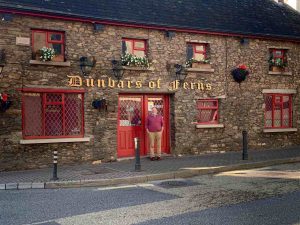
For Tom Dunbar, the failure to reopen the first time was “such a deflation:” with only two days’ notice being given.
Mellett’s Emporium, Swinford
For Marie Mellett of Mellett’s Emporium in Swinford, County Mayo, it was also a case of third time lucky having endured two ‘false starts’.
The drink that had been ordered and delivered had to be taken back but the suppliers were really good about it, she told Drinks Industry Ireland.
“We’d turn on the fridges about a week beforehand, start up the cold room and the heating etc only to be told we weren’t opening!”.
“We’d also hired staff to come in for the July and 10th of August reopening dates for five days of work,” she adds.
They’ve deep-cleaned the pub four times now!
So, before Level 5 restrictions were introduced, while she had reopened since, she was also very aware that they could be closed again at any moment.
“Now, we won’t open two cases of bottled beer at the same time. In March we were left with an obscene amount of stock comprising half-open cases so it was a serious loss,” she explains.
In addition, the closures were a baptism of fire for Marie, a seventh generation publican who’d just taken over the pub licence after 40 years from her father Joe.
And in reopening, she’d also become acutely aware of the amount of waste being generated to comply with Covid countermeasures.
“Bar staff aren’t allowed to dry their hands on a standard towel so we use paper towels,” she says, “We’re going through reams of it and the bins are constantly full.”
Then there’s death by a thousand cuts.
“It’s small in the grand scheme of things” she offers, “but another cost nonetheless – we’ve six automatic hand sanitisers, four automatic soap dispensers and four hands-free taps – in total we’d to buy 76 AA batteries for them!”
Up to the introduction of Level 5 restrictions, she’d not had to let any staff go as a result of the pandemic.
“We actually took on a new member of staff thanks to the EWSS which, while not enough, is still a great help,” she says, “But we’ve to cover the wages for six weeks until payment is made. The biggest problem with that is that tomorrow is pay day and I’m not sure where the money is going to come from. It’s a huge problem for lots of places.”
For Marie, the most annoying aspect of the whole thing is that no barstools are allowed in the rural pub.
On reopening on the Monday night they were at full capacity with just 10 people in the pub.
“That’s not sustainable,” she believes, “The barstool situation could be the death of the rural pub.”

“We won’t open two cases of bottled beer at the same time” – Marie Mellett was very aware that they could have been closed again at any moment.
This is a common story says Brian Foley, VFI Communications and Public Affairs Manager.
“Never before has a business sector experienced what the pub trade has gone through over the past six months. When we closed on 15th March the general assumption was pubs would reopen in a matter of weeks. The ensuing drawn-out process was torture for many of our members.
“From the outset publicans wanted to know two things – when and how; when could they open and what guidelines were required. There was huge frustration over the Summer months as we attempted to obtain guidelines for reopening which only appeared days before the scheduled 20th July opening date. Then reopening was postponed, a disappointment publicans were unfortunately going to get used to.
“There was huge enthusiasm amongst publicans to get it right, installing everything from hand sanitisers, signage and contract tracing to protective gear for staff and cleaning protocols. It’s all geared towards making customers and staff as safe as possible but it shouldn’t be forgotten the work to make pubs ready for the ’new normal’ was undertaken when publicans had overnight lost their entire livelihoods.
“Having gone through hell, they’re finally open and finding their feet,” he says, some days prior to Level 5 restrictions being introduced, “The pressure remains though as the country ducks and weaves in its battle with Covid; publicans face the threat of trading being limited to outdoor areas if NPHET deem their county to be at risk, like Donegal. For now, most are simply glad to be reopen and back meeting old regulars.”

“There was huge frustration over the Summer months as we attempted to obtain guidelines for reopening which only appeared days before the scheduled 20th July opening date.” – Brian Foley.
Dublin closed
In Dublin, around 250 pubs that don’t serve food were prevented from opening for the fourth time while those that did serve food – were closed anyway as the capital moved to Level Three.
Gary Cusack of Mulligan’s of Poolbeg Street found the many ‘false dawns’ to be very annoying.
“Getting so close and then being told ‘no’,” he recalls, “When the lockdown came on Paddy’s Weekend we had 120 to 150 kegs in Mulligan’s. We sell a lot of Guinness but unfortunately it had to go out and back onto the truck.”
While closed, initially, they got all the jobs done that needed to be done.
“We’d the floors redone, the furniture cleaned and we did a lot of work on our cellar. The wiring was also updated – it was a lot easier to do it while we were closed.
“But there’s only so much painting and cleaning and decluttering that you can do and we did it all in the first weeks.”
Now he finds being closed simply frustrating.
After 32 years in the family-run pub he and his brother Ger just want to get back open again.
“When it came to reopening, we always waited for guidance from the government so we didn’t do anything before the first couple of false starts,” he says, “It was only for the last two dates that we actually went to work putting in partitions, setting up sanitiser stations, putting in Perspex and introducing extra chairs and tables.
“If we have a week’s notice we’ll get the cold room back up-and-running, replenish the ice-makers and liaise with the breweries to deliver stock.
“All the staff have done the Covid-19 course online and myself and Ger, along with our nephew Darren, are looking at introducing separate bubbles of staff on one shift that never meet the other shift.
“We’ve set up two separate pods that will never cross paths.”
In all, Gary reckons he’d to spend between €5,000 and €10,000 on preparing Mulligans for reopening.

“If we have a week’s notice we’ll get the cold room back up-and-running, replenish the ice-makers ad liaise with the breweries to deliver stock.” – Gary Cusack.
It’s difficult to find a ‘wet’ publican in Dublin who isn’t fed-up with the constant ‘on/offedness’ of the reopening dates initially given and subsequently retracted by government.
Others had adapted in order to survive by going into partnership with a nearby pizzeria to fulfil the €9 meal threshold qualification.
Many publicans had put a great deal of work into the setting-up of staff rosters etc for the opening dates originally proposed – the 29th of June, the 20th of July, the 10th of August and the 31st of August – only to get the slap of disappointment.
“The 20th of July was the shocker,” believes LVA Chief Executive Donall O’Keeffe, “That’s when the mood music changed very close to the dates given in an environment of there having been no significant change in the infection rate.
“There was huge investment in management time and expense as well as the once-off but substantial cost of recreating the physical infrastructure in the Dublin pubs for these reopening dates,” he explains, pointing out that table arrangements had to be re-thought, customer management had to be pre-planned.
“There was all that time spent as well as the distress, hassle and emotions that went into these preparations for a day that, ultimately, they didn’t get to open on,” he said, “This was compounded by the absolute lack of clarity going forward.”
At the time of going to press, before the introduction of Level 5 restrictions, Donall O’Keeffe describes Dublin publicans as being in “deep despair, extremely frustrated and disillusioned” with a government who’ve let four reopening dates pass by for wet pubs in the capital.
“The trade has done all that’s been asked of them and so to remain closed is just heartbreaking,” he says, “The uncertainty is the killer. We could handle it if we had a definitive date on re-opening but we’ve no confidence on the next reopening date given being adhered to.”
It’s conceivable, he tells Drinks Industry Ireland, that the country is heading towards rolling lockdowns and restrictions.

“The trade has done all that’s been asked of them and so to remain closed is just heartbreaking.” – Donall O’Keeffe.
Drinks Ireland’s #OpeningTime campaign
Drinks Ireland had only recently launched its #OpeningTime campaign to highlight how pubs are regulated environments and responsible businesses.
It also emphasised the huge investment, time and effort that goes into reopening pubs from both the publicans’ and the drinks suppliers’ perspective.
Suppliers point out that once delivered to a pub, beer and cider cannot be kept in storage for lengthy periods as they’ll go off.
Thus brewing is a costly and time-consuming process. Suppliers had already started to work with Dublin publicans countrywide all over again to supply product for the last re-opening, delivering kegs ahead of the September the 21st date. They also worked with pubs to clean beer lines in advance of re-opening.
“We’ve played our part in supporting the sector by investing in the collection and sustainable repurposing of the beer over the past six months,” stated Heineken Ireland’s Chief Executive Maarten Schuurman.
His counterpart at Diageo Ireland, Oliver Loomes, added that Diageo’s preparations have ranged from “cleaning beer lines and collecting unused kegs to providing extended credit”.
Drinks Ireland Director Patricia Callan, who’d called on the Government to avoid this ‘stop and start’ approach to re-opening pubs, points out that these ‘stop and starts’ are bad for the pubs concerned, for the suppliers but also for the economy and society.
“As a result of previous ‘false starts’ beer was brewed and delivered, beer lines were cleaned and subsequently breweries had to do a massive keg uplift as the pubs then couldn’t re-open,” she says.
“This is now the fourth time new product has been brewed and delivered in kegs to Dublin pubs to then not be used. It’s also the fourth time drinks suppliers have worked with pubs in Dublin to clean beer lines ahead of a re-opening.
“This is now the fourth time that pubs in Dublin that do not serve food have been told they could re-open to then be told, at very short notice, that they no longer can.
“It’s completely disproportionate and unfair for these pubs to be treated as political scapegoats and differently to the rest of the hospitality sector. Dublin pubs that serve food had reopened safely.”

Drinks Ireland Director Patricia Callan, who’d called on the Government to avoid this ‘stop and start’ approach to re-opening pubs.
Supplier costs
Indeed, the cost to suppliers of these false starts in pubs that closed for so long involves dealing with significant ‘legacy stock’.
“During that time we had to replace stock that remained unsold which was costly as it had sat there in some instances since last March,” explains David Whelan, Bulmers Commercial Director, “We carried out an uplift and have given credit to the trade for this.
“In addition, we invested some €1,500 in 500 pubs around the country over the last few months,” he says.
Following the first false alarm, suppliers were more circumspect about getting supplies out to the on-trade for the second proposed reopening date.
“We’ve probably taken a more pragmatic approach over recent times,” he reckons of the repeated postponements, looking to see ‘the whites of their eyes’ in government before placing stock.
Certainly the Friday evening announcement on the 18th of September for the cancellation of reopening for non-food pubs in Dublin the following Monday the 21st of September – and the closing of restaurants and non-food pubs at midnight that very night was way too late for both the on-trade and its suppliers.

“We had to replace stock that remained unsold which was costly as it had sat there in some instances since last March.” – David Whelan.
“There was a roadmap launched earlier in the week and for that to change at the back-end of the same week was incredibly disruptive and disheartening,” he explains, “At a minimum, a lot of those pubs will have been closed for 220 days by end of the latest Lockdown in Dublin which would have ended on October the 12th and we’re seeing the impact of this on them and on ourselves as suppliers – and on our staff.”
Heineken Ireland deployed the largest operation in its history which saw its teams clean the beer and cider taps in every one of the outlets across the country following the swift lockdown in March.

“We collected over 100,000 kegs of beer and cider and committed to shouldering the cost of the unused stock in outlets.” – Heineken Ireland’s Commercial Director Sharon Walsh.
“We collected over 100,000 kegs of beer and cider and committed to shouldering the cost of the unused stock in outlets,” comments Heineken Ireland’s Commercial Director Sharon Walsh, “This was the equivalent to a contribution of over 10 million pints to pubs across Ireland. This contribution ensured that all Heineken Ireland product in outlets around the country was at peak freshness and of the highest quality when the sector started to reopen from the 29th June. We also remained committed to our Sustainability Strategy, Brewing a Better World, by repurposing the beer collected for green energy and animal feed.
“We worked closely with those pubs as they got ready to open and prepare for the new reality. We found that our customers were particularly concerned with being kept informed of the latest updates on supports, learnings from how other European pub sectors were responding to the crisis and how best to reopen under the new guidelines.
“To address these needs, we developed an innovative new Pub Hub digital platform to keep connected to our customers and allow them to access information and advice from Europe and from their peers who have been able to open earlier.
“However, the delay in reopening the so-called ‘wet pubs’, along with the decision not to open these pubs in Dublin and to close hospitality in counties at Level 3 of the Living with Covid Plan, is a real challenge for our customers and for our own business. Remember, those pubs in Donegal had only just opened four days before they were told they had to shut their doors again.
“The pub sector is a highly regulated environment and they’ve played their part as responsible businesses throughout this crisis. Neither they, nor suppliers such as ourselves, can continue with this level of uncertainty and the disproportionate constraints we are faced with,” she concludes.
At the time of going to press the trade awaits developments on whether Level 5 might be reduced to Level 3 in December.
And Christmas is coming in fast with this last calendar month now being by far and away the most important trading month of the year.
Hark.
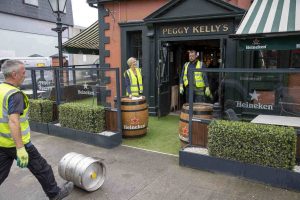
Heineken Ireland deployed the largest operation in its history which saw its teams clean the beer and cider taps in every one of the outlets across the country following the swift lockdown in March.





